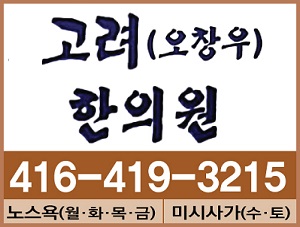CA
ON
조준상 (로열르페이지 한인부동산 대표)
전화: 416-449-7600
1993 Leslie St. Toronto, ON

행복부동산 -수잔정 Home Standards Brickstone Real
전화: 647-866-7878
180 Steeles Ave W Unit 30, Thornhill, ON

한인을 위한 KOREAN JOB BANK
전화: 6476245886
4065 Chesswood Drive Toronto, ON
.jpg)
토론토 기쁨이 충만한 교회
전화: 416-663-9191
1100 Petrolia Rd Toronto, ON

캐나다 공인 컨설턴트 - 한인크레딧 컨설팅
전화: 416-897-8438
1 High Meadow Place, Unit 2 North York, ON

홍이표치과
전화: 647-985-0456
9625 Yonge St #4, Richmond Hill, ON Toronto, ON
1.jfif)
놀부 - 한식/일식/중식
전화: 416-221-4700
3 Elmhurst Ave, North York, ON

변호사 정찬수 법률사무소
전화: +82 2-536-1144
서울특별시 서초구 서초동 Toronto, ON
1.jfif)
토론토 민박 전문집
전화: 416-802-5560
Steeles & Bathurst ( Yonge) Toronto, ON

부동산캐나다 (Korean Real Estate Post)
전화: 416-449-5552
1995 Leslie Street Toronto, ON
.jfif)
골프 싱글로 가는길
전화: 647-291-2020
115 York Blvd Richmond Hill Toronto, ON

고려 오창우 한의원
전화: 416-226-2624
77 Finch Ave W #302, North York Toronto, ON

It would be a place where all the visitors including me share the life stories and experiences through their activities,especially on life as a immigrant.
Why don't you visit my personal blog:
www.lifemeansgo.blogspot.com
Many thanks.
블로그 ( 오늘 방문자 수: 302 전체: 267,865 )
노 전대통령 자살로 생 마감 - 와싱턴 포스트에서
lakepurity
2009-05-23
Former S. Korean President Roh Dies in Apparent Suicide
In this April 30, 2009 photo, former South Korean President Roh Moo-hyun arrives for questioning in a corruption scandal at the Supreme Public Prosecutor's Office in Seoul, South Korea. A news report said on Saturday, May 23, 2009 that Roh appears to have died after a fall while mountain climbing. (AP Photo/Yonhap, Kim Ju-sung) (Kim Ju-sung - AP)
By Blaine Harden and Stella Kim
Washington Post Foreign Service
Saturday, May 23, 2009; 3:38 AM
TOKYO, May 23 -- Former South Korean president Roh Moo-hyun, a suspect in a corruption scandal that implicated his wife and family, apparently committed suicide Saturday by leaping from a mountain cliff near his rural home.
Roh, 62, died of head injuries while hiking in the early morning with a bodyguard. "He appears to have jumped from a mountain rock," said Moon Jae-in, a lawyer who was Roh's presidential chief of staff.
"The suffering caused by me is too great to too many people," Roh wrote in a suicide note found soon after his death. "The suffering in store for the future is too much to bear. The remainder of my life will only be a burden to others."
Roh, who left office last year after a five-year term, was questioned for nearly 13 hours late last month by prosecutors. They were investigating allegations that during his presidency he and members of his family accepted more than $6 million in bribes from a wealthy South Korean shoe manufacturer.
At the time of the questioning, Roh did not admit personal wrongdoing but apologized to the country for his family's involvement in the scandal. Prosecutors are looking into a $1.6 million payment to his wife and a $5 million payment to the husband of one Roh's nieces.
"I am sorry for disappointing you," he told reporters. "I have no face to show to the people."
Shortly after Roh's death, the South Korean minister of justice, Kim Kyung-han, announced that "the ongoing investigation regarding the former president Roh will end."
South Korean news reports said that in the three days before his death, Roh missed meals and spent hours alone in the study of his house in rural Bonghwa Village, about 270 miles south of Seoul.
He had started smoking again and had seemed agitated that his wife had again been called by prosecutors to come to their office, Roh's aides told news outlets. He was also said to be upset that his son, daughter and son-in-law were facing interrogation.
The 164-foot precipice that Roh jumped from, known as Owl Rock, is less than 200 yards from his home.
The bodyguard who accompanied Roh on Saturday's mountain hike, was distracted by the former president, when Roh pointed to people walking down below, according to a spokesman in the office of South Korean President Lee Myung-bak.
When the bodyguard turned back to look at Roh, the former president had jumped, the spokesman said.
From a poor farming family, Roh rose to power as a champion of students and left-leaning citizens who hated the military dictatorships that ruled in the 1980s and wanted a more equitable distribution of wealth and economic opportunity in South Korea.
Roh was also an acerbic critic of the United States and the powerful role it has played since the Korean War in shaping South Korean policy. In his 2002 election campaign, he promised never to "kowtow" to the Americans.
In a country that pays obsessive attention to educational credentials, he did not have prestigious degrees and was notably unpolished. He attended a commercial high school, never received a college diploma and there were many who said he did not speak proper Korean.
But he passed the bar exam and made his name defending students who protested military rule.
During his presidency, Roh steadfastly pursued a generous and non-confrontational policy toward North Korea, the heavily armed and prickly communist state on his country's northern border.
Continuing the "sunshine policy" of his predecessor, President Kim Dae-jung, Roh traveled in 2007 to Pyongyang for a summit with North Korean leader Kim Jong Il.
Critics said Roh's government ignored human rights abuses in North Korea and helped prop up its collapsed centralized economy with gifts of food and fertilizer. Under Roh, South Korea rarely asked questions about whether its aid went to hungry people or to the military and ruling elite.
In the last years of his presidency, however, it was primarily a sluggish economy in South Korea that soured Roh's approval numbers. A majority of voters wanted faster growth, polls showed, and were indifferent to his peaceful embrace of North Korea.
Kim reported from Seoul.